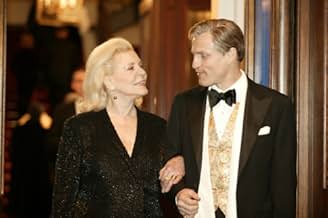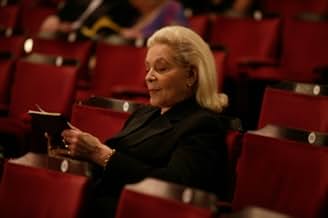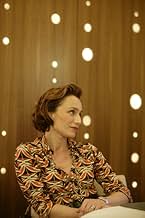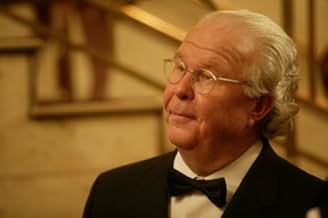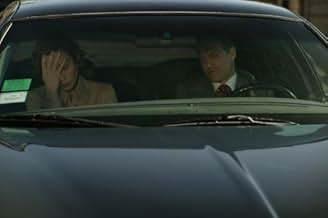VALUTAZIONE IMDb
5,8/10
6008
LA TUA VALUTAZIONE
Aggiungi una trama nella tua linguaAn escort who caters to Washington, D.C.'s society ladies becomes involved in a murder case.An escort who caters to Washington, D.C.'s society ladies becomes involved in a murder case.An escort who caters to Washington, D.C.'s society ladies becomes involved in a murder case.
- Premi
- 1 vittoria in totale
Recensioni in evidenza
Carter Page III (Woody Harrelson) is effete, witty, charming, full of himself and full of ripe, juicy, trenchant commentary on the Washington social scene and its denizens. He has to be - it is literally his life. Carter is what's known in Washingtonian parlance as a "walker". He squires about the rich and powerful wives of the rich and powerful men on the Hill, whenever they require a male escort to attend dinners, benefits and other social gatherings. You know - the ones their husbands would rather jump off a building than attend. And because Carter is a bonafied "Friend of Dorothy," there's none of that pesky bother of having to worry if he'll climb into the wives' beds, the way he slips so smoothly into their confidences.
But somewhere between the glittering parties and the bon-mot laden games of canasta, reality bites in the form of a brutal murder; the victim being the lover of one of Carter's "special friends." Ever the dutiful confidante, Carter covers for her without realizing exactly what he's letting himself in for, especially when the connections he thought he had begin to dry up and wither like the flowers on a table from a party that ended years ago. Though he literally has spent his life putting the "art" into artifice, Carter must now look beyond the boundaries of his superficiality and that of his so-called friends and acquaintances, if he wants to save his own hide.
The "outsider looking in", even if he is part of the world that holds him at arm's length is one of director Paul Schrader's favorite themes; one he has visited repeatedly, whether he served as a writer (TAXI DRIVER), a director (AUTO FOCUS) or both (AMERICAN GIGOLO) as he does here. As he explores it yet again using the country's seat of power as his landscape, he is certainly served well by an outstanding cast.
Harrelson's acting has never been as subtle and yet powerful as he inhabits Carter, rather than just playing the character. Kristin Scott-Thomas radiates beauty and desperation as his friend-in-trouble, and the ensemble is well-rounded out by Willem Dafoe as Scott-Thomas's husband; the regal presence of Lauren Bacall; Lily Tomlin in a very restrained mode as a power broker's wife; Ned Beatty as her husband, Mary Beth Hurt as another one of Carter's "canasta" group and William Hope as an extremely unpleasant Attorney General who is very reminiscent of a certain Mr. Spitzer.
Special mention must be made of Moritz Bleibtreu as Emek, Carter's German-Iranian boyfriend and the only person who really stands by him when the designer crap hits the fan, and has nothing to gain from it but his partner's love. (Well, there IS the matter of finding a gallery to exhibit his politically-charged photo art, based explicitly on the the Abu Ghraib scandal). But kudos to Bleibtreu for matching Harrelson as they modulate the complexities of their relationship without falling back on the usual stereotypical tics and camp flourishes.
With the lush production design and costuming augmented by the oh-so fitting songs of Brian Ferry (which Anne Dudley's nearly ambient score is based upon), THE WALKER is a pretty film to look at and be taken in by...as pretty and alluring as Carter is himself. Until you discover - as he himself does - that underneath all the trappings, the wealth, the elitist vanity is a void, where friendship, compassion, love, fidelity...not a single one of those things really exists. The movie isn't so much about him solving the murder mystery that hangs over him like the Sword of Damocles, but the "mystery of his own life" - finding all of those things he traded in for life among the political elite.
Not a light and frivolous way to pass the time, much like most Schrader films. In fact, many viewers might turn it off before getting halfway through. But the Oscar-worthy work from Harrelson is definitely worth sticking around for.
But somewhere between the glittering parties and the bon-mot laden games of canasta, reality bites in the form of a brutal murder; the victim being the lover of one of Carter's "special friends." Ever the dutiful confidante, Carter covers for her without realizing exactly what he's letting himself in for, especially when the connections he thought he had begin to dry up and wither like the flowers on a table from a party that ended years ago. Though he literally has spent his life putting the "art" into artifice, Carter must now look beyond the boundaries of his superficiality and that of his so-called friends and acquaintances, if he wants to save his own hide.
The "outsider looking in", even if he is part of the world that holds him at arm's length is one of director Paul Schrader's favorite themes; one he has visited repeatedly, whether he served as a writer (TAXI DRIVER), a director (AUTO FOCUS) or both (AMERICAN GIGOLO) as he does here. As he explores it yet again using the country's seat of power as his landscape, he is certainly served well by an outstanding cast.
Harrelson's acting has never been as subtle and yet powerful as he inhabits Carter, rather than just playing the character. Kristin Scott-Thomas radiates beauty and desperation as his friend-in-trouble, and the ensemble is well-rounded out by Willem Dafoe as Scott-Thomas's husband; the regal presence of Lauren Bacall; Lily Tomlin in a very restrained mode as a power broker's wife; Ned Beatty as her husband, Mary Beth Hurt as another one of Carter's "canasta" group and William Hope as an extremely unpleasant Attorney General who is very reminiscent of a certain Mr. Spitzer.
Special mention must be made of Moritz Bleibtreu as Emek, Carter's German-Iranian boyfriend and the only person who really stands by him when the designer crap hits the fan, and has nothing to gain from it but his partner's love. (Well, there IS the matter of finding a gallery to exhibit his politically-charged photo art, based explicitly on the the Abu Ghraib scandal). But kudos to Bleibtreu for matching Harrelson as they modulate the complexities of their relationship without falling back on the usual stereotypical tics and camp flourishes.
With the lush production design and costuming augmented by the oh-so fitting songs of Brian Ferry (which Anne Dudley's nearly ambient score is based upon), THE WALKER is a pretty film to look at and be taken in by...as pretty and alluring as Carter is himself. Until you discover - as he himself does - that underneath all the trappings, the wealth, the elitist vanity is a void, where friendship, compassion, love, fidelity...not a single one of those things really exists. The movie isn't so much about him solving the murder mystery that hangs over him like the Sword of Damocles, but the "mystery of his own life" - finding all of those things he traded in for life among the political elite.
Not a light and frivolous way to pass the time, much like most Schrader films. In fact, many viewers might turn it off before getting halfway through. But the Oscar-worthy work from Harrelson is definitely worth sticking around for.
To be a walker is to be something if not someone or, if you prefer, a walker is someone without being something. Whatever way you look at it, there is something that it's desperately not there. Woody Harrelson and his character, act. Acting as a way of life. Trying to be trivial all the time runs the risk of making triviality something truly important. We're standing on the sidelines looking in without seeing because if we saw, well, if we saw, things may be dramatically different. This is a film by Paul Schrader - a master in getting into the hearts and souls of the outsiders - and Harrelson is an outsider living in, with a very specific awareness. Great! A film to savor and listen to, attentively. Not very often one can actually say that. Other than Harrelson, Lauren Bacall, Kristin Scott Thomas and Lily Tomlin shine.
This film is about a male escort getting involved in a murder investigation that happened in the circle of powerful men's wives.
I thought "The Walker" would be thrilling and engaging, but I was so wrong. The pacing is painfully and excruciatingly slow, that even after 40 minutes of the film nothing happens much. Seriously, the first hour could be condensed into ten minutes. That's how slow it is.
The fact that it lacks any thrills or action scenes aggravates the boredom. It's almost shocking that even argument scenes are so plain and devoid of emotion. Maybe it is because of the stiff upper lip of the higher social class?
It's sad that "The Walker" becomes such a boring mess, despite such a strong cast. Blame it on the poor plot and even worse pacing.
I thought "The Walker" would be thrilling and engaging, but I was so wrong. The pacing is painfully and excruciatingly slow, that even after 40 minutes of the film nothing happens much. Seriously, the first hour could be condensed into ten minutes. That's how slow it is.
The fact that it lacks any thrills or action scenes aggravates the boredom. It's almost shocking that even argument scenes are so plain and devoid of emotion. Maybe it is because of the stiff upper lip of the higher social class?
It's sad that "The Walker" becomes such a boring mess, despite such a strong cast. Blame it on the poor plot and even worse pacing.
8jjwl
Great script, direction and acting.
The pacing is deliberate as character development (and exposition) is so key to the story. On the other hand, the last few scenes of the film seem a bit rushed as the main source of dramatic tension is resolved somewhat abruptly.
Overall a strong film, with standout performances from Harrelson, Bacall, Scott-Thomas, and Bleibtreu.
On a more personal note ...
I screened this at the Toronto International Film Festival as it premiered at Roy Thomson Hall. There was a projection problem midway into the film, caused by a bad splice. An intermission was announced to give the technical team sufficient time to re-splice the film.
During this intermission, which ended up stretching to nearly 45 minutes, Mr. Schrader and Ms. Bacall took the stage and entertained the audience with a far-ranging and candid Q & A session. This was a very generous and gracious gesture, and very much appreciated.
It was a real treat to see Ms. Bacall in this film and at the premiere. She is a legend many times over, and 60+ years into her storied career, she continues to exude class, strength and glamour. They don't make stars like this anymore, and we are the poorer for it.
The pacing is deliberate as character development (and exposition) is so key to the story. On the other hand, the last few scenes of the film seem a bit rushed as the main source of dramatic tension is resolved somewhat abruptly.
Overall a strong film, with standout performances from Harrelson, Bacall, Scott-Thomas, and Bleibtreu.
On a more personal note ...
I screened this at the Toronto International Film Festival as it premiered at Roy Thomson Hall. There was a projection problem midway into the film, caused by a bad splice. An intermission was announced to give the technical team sufficient time to re-splice the film.
During this intermission, which ended up stretching to nearly 45 minutes, Mr. Schrader and Ms. Bacall took the stage and entertained the audience with a far-ranging and candid Q & A session. This was a very generous and gracious gesture, and very much appreciated.
It was a real treat to see Ms. Bacall in this film and at the premiere. She is a legend many times over, and 60+ years into her storied career, she continues to exude class, strength and glamour. They don't make stars like this anymore, and we are the poorer for it.
"Whoever has looked deeply into the world might well guess what wisdom lies in the superficiality of men," is a quotation attributed to Nietzsche. The first half of The Walker could be said to demonstrate such a principle, particularly the mien of its chief protagonist, Carter Page III (flawlessly played by Woody Harrelson). Yet the second half would give that observation an altogether more cynical meaning. One appropriate to the very men that Page despises.
Page exhibits the exquisite superficiality ("I'm not naïve: I'm superficial") so often associated with camp intellectuals (as well as a capacity for self-adulation). We first meet him during an opening panning shot that examines the luxurious wall fabrics in the room where several voices can be heard. Wall furnishings are something that Page III can associate with. Both in a literal aesthetic sense, and also as a man that is walled in by the societal prejudices against his homosexuality. One step removed from the visceral world of those who can openly admit their true feelings, Page III examines the details of everyday life with dispassion and critical elegance. But when his friend Lynn Lockner (wife of a liberal senator) discovers a murder, he is torn between two paths, both equally morally repugnant.
While not quite a saint, Page III has a much higher sense of decency than the political connivers and sexually bigoted people that surround him. These people use superficial appearances to make money, win office, or rise at any cost. Their 'wisdom' is simply that of the top dog having torn and bloodied anyone who stood in their way.
Bacall, instantly recognisable by her charismatic voice, is the perfect foil for Page's charm and mendacity. Quick-witted, she reminds us of her early characters in films like To Have and Have Not and Key Largo. "You were just a young slip of a girl, not the beautiful woman you are now," says Page. "Cut the sh*t!" she replies, without for a minute losing her majestic gravitas.
Page is a 'Walker' although working one day a week in a real estate office, his main income is comes from when he "walks rich women from place to place." The term was coined for Jerry Zipkin, who was Nancy Reagan's 'walker'. His duties include amusing gossip, taking Lynn to the opera and a weekly game of canasta. Immaculately dressed and coiffured, he inhabits the world of the unostentatiously rich without ever becoming a main player. His father was a respected governor and his father before him a successful businessman ("My grandfather always talked like a man with a bible half-open in his head."). He is gay, and therefore not a threat. And he is well-read, well-bred, and a delightful conversationalist.
Yet although Harrelson stars in every scene, The Walker succeeds very much as an ensemble piece. Bacall and Kristin Scott Thomas have a fair share of excellent lines. "Memory is a very unreliable organ," says Bacall: "It's right up there with the penis." Kristin Scott Thomas also gives Page a fair run for his money. When he says dismissively in a conversation that, "it's just sex," she retorts with, "And that stuff you're breathing is just oxygen!" Page has an unlikely lover in the form of Emek Yoglu, a German-Turkish artist whose photography is too politically loaded for Page's tastes. But the main man in Page's life is his dead father, who symbolises both the success Page III has never achieved and perhaps moral double-standards that he loathes. Yet at the same time Page himself leads a life a double-life, not out of choice but because it is forced on him.
Writer/director Paul Schrader picked Washington DC as the setting for the film because of "the deep hypocrisy of the town, Washington and Salt lake City are two of the last cities in America where sexual hypocrisy is mandated, and here is a character living a false and superficial life, so it seemed an ideal place for it." It is one of Schrader's best scripts (apart from a few unlikely coincidences to move the plot along) and the performances are perfect. The lush cinematography sucks us into the world of the rich and stylish (with Bryan Ferry songs to assure us it's OK) so that 'reality' in the form of murder most foul is all the more unsettling. Only as the authorities brazenly attempt to implicate Page do some of his hairs come out of place. "This is a mean crowd, this administration," he admits falteringly. (Lynn calls them 'the cave dwellers'). They can't catch him for what he hasn't done so they'll find something else. "It's perjury that catches people out," the investigator says to him (with shades of Clinton witch-hunting).
The loner-whose-world-crumbles-around him is a favourite premise for Schrader and the subtle political complexities are home territory for Harrelson, who is no stranger to such themes in films such as North Country, Wag the Dog, Welcome to Sarajevo and The People vs. Larry Flynt. But the film's weakness is its constant subtlety. We are expected to be fascinated by the undercurrents, the hidden cards so much so that some audiences may switch off. The Walker is clever and perfectly executed but, like its subject matter, is a superficial observer of the dilemmas it grapples with at arm's length.
Perhaps such prominence of aesthetics over substance is the way to provoke discussion of the problems dealt with so obtusely. "I think film is a great medium to be able to discuss such issues," says Kristin Scott Thomas. "Although politics changes very rapidly, it also repeats itself over and over in a different context. When you see films that are making a comment about the political situation of a certain time and then you see another film thirty years later and you have the same kind of issue, it creates discussion and that is very important."
Page exhibits the exquisite superficiality ("I'm not naïve: I'm superficial") so often associated with camp intellectuals (as well as a capacity for self-adulation). We first meet him during an opening panning shot that examines the luxurious wall fabrics in the room where several voices can be heard. Wall furnishings are something that Page III can associate with. Both in a literal aesthetic sense, and also as a man that is walled in by the societal prejudices against his homosexuality. One step removed from the visceral world of those who can openly admit their true feelings, Page III examines the details of everyday life with dispassion and critical elegance. But when his friend Lynn Lockner (wife of a liberal senator) discovers a murder, he is torn between two paths, both equally morally repugnant.
While not quite a saint, Page III has a much higher sense of decency than the political connivers and sexually bigoted people that surround him. These people use superficial appearances to make money, win office, or rise at any cost. Their 'wisdom' is simply that of the top dog having torn and bloodied anyone who stood in their way.
Bacall, instantly recognisable by her charismatic voice, is the perfect foil for Page's charm and mendacity. Quick-witted, she reminds us of her early characters in films like To Have and Have Not and Key Largo. "You were just a young slip of a girl, not the beautiful woman you are now," says Page. "Cut the sh*t!" she replies, without for a minute losing her majestic gravitas.
Page is a 'Walker' although working one day a week in a real estate office, his main income is comes from when he "walks rich women from place to place." The term was coined for Jerry Zipkin, who was Nancy Reagan's 'walker'. His duties include amusing gossip, taking Lynn to the opera and a weekly game of canasta. Immaculately dressed and coiffured, he inhabits the world of the unostentatiously rich without ever becoming a main player. His father was a respected governor and his father before him a successful businessman ("My grandfather always talked like a man with a bible half-open in his head."). He is gay, and therefore not a threat. And he is well-read, well-bred, and a delightful conversationalist.
Yet although Harrelson stars in every scene, The Walker succeeds very much as an ensemble piece. Bacall and Kristin Scott Thomas have a fair share of excellent lines. "Memory is a very unreliable organ," says Bacall: "It's right up there with the penis." Kristin Scott Thomas also gives Page a fair run for his money. When he says dismissively in a conversation that, "it's just sex," she retorts with, "And that stuff you're breathing is just oxygen!" Page has an unlikely lover in the form of Emek Yoglu, a German-Turkish artist whose photography is too politically loaded for Page's tastes. But the main man in Page's life is his dead father, who symbolises both the success Page III has never achieved and perhaps moral double-standards that he loathes. Yet at the same time Page himself leads a life a double-life, not out of choice but because it is forced on him.
Writer/director Paul Schrader picked Washington DC as the setting for the film because of "the deep hypocrisy of the town, Washington and Salt lake City are two of the last cities in America where sexual hypocrisy is mandated, and here is a character living a false and superficial life, so it seemed an ideal place for it." It is one of Schrader's best scripts (apart from a few unlikely coincidences to move the plot along) and the performances are perfect. The lush cinematography sucks us into the world of the rich and stylish (with Bryan Ferry songs to assure us it's OK) so that 'reality' in the form of murder most foul is all the more unsettling. Only as the authorities brazenly attempt to implicate Page do some of his hairs come out of place. "This is a mean crowd, this administration," he admits falteringly. (Lynn calls them 'the cave dwellers'). They can't catch him for what he hasn't done so they'll find something else. "It's perjury that catches people out," the investigator says to him (with shades of Clinton witch-hunting).
The loner-whose-world-crumbles-around him is a favourite premise for Schrader and the subtle political complexities are home territory for Harrelson, who is no stranger to such themes in films such as North Country, Wag the Dog, Welcome to Sarajevo and The People vs. Larry Flynt. But the film's weakness is its constant subtlety. We are expected to be fascinated by the undercurrents, the hidden cards so much so that some audiences may switch off. The Walker is clever and perfectly executed but, like its subject matter, is a superficial observer of the dilemmas it grapples with at arm's length.
Perhaps such prominence of aesthetics over substance is the way to provoke discussion of the problems dealt with so obtusely. "I think film is a great medium to be able to discuss such issues," says Kristin Scott Thomas. "Although politics changes very rapidly, it also repeats itself over and over in a different context. When you see films that are making a comment about the political situation of a certain time and then you see another film thirty years later and you have the same kind of issue, it creates discussion and that is very important."
Lo sapevi?
- QuizWriter and Director Paul Schrader told HX Magazine that Woody Harrelson refused to do any publicity for this movie because he was dissatisfied with his own performance in it.
- BlooperThe second time Woody Harrelson's character is interrogated by the police, he has a gold waistcoat on. However, when he leaves the building the waistcoat had disappeared.
- Citazioni
Natalie Van Miter: Memory is a very unreliable organ. Trust me Car, it's right up there with the penis.
- Colonne sonoreWhich Way to Turn
Performed by Bryan Ferry
Written by Bryan Ferry
Published by EMI Publishing Ltd
Licensed Courtesy of Virgin Records Ltd
I più visti
Accedi per valutare e creare un elenco di titoli salvati per ottenere consigli personalizzati
Dettagli
Botteghino
- Budget
- 10.000.000 USD (previsto)
- Lordo Stati Uniti e Canada
- 79.698 USD
- Fine settimana di apertura Stati Uniti e Canada
- 16.525 USD
- 9 dic 2007
- Lordo in tutto il mondo
- 590.416 USD
- Tempo di esecuzione1 ora 48 minuti
- Colore
- Mix di suoni
- Proporzioni
- 2.35 : 1
Contribuisci a questa pagina
Suggerisci una modifica o aggiungi i contenuti mancanti

Divario superiore
By what name was The Walker (2007) officially released in India in English?
Rispondi





